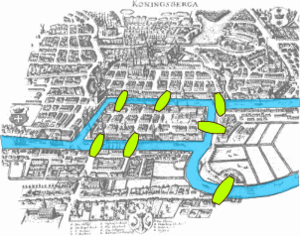Seven Bridges of Königsberg (nonfiction): Difference between revisions
No edit summary |
No edit summary |
||
| Line 15: | Line 15: | ||
<gallery> | <gallery> | ||
File:Leonhard Euler.jpg|link=Leonhard Euler (nonfiction)|August 26, 1735: Mathematician and physicist [[Leonhard Euler (nonfiction)|Leonhard Euler]] presents his solution to the Königsberg bridge problem – whether it was possible to find a route crossing each of the seven bridges of the city of Königsberg once and only once – in a lecture to his colleagues at the Academy of Sciences in St. Petersburg. | |||
</gallery> | </gallery> | ||
Latest revision as of 13:39, 19 August 2018
The Seven Bridges of Königsberg is a historically notable problem in mathematics. Its negative resolution by Leonhard Euler in 1736 laid the foundations of graph theory and prefigured the idea of topology.
The city of Königsberg in Prussia (now Kaliningrad, Russia) was set on both sides of the Pregel River, and included two large islands - Kneiphof and Lomse - which were connected to each other, or to the two mainland portions of the city, by seven bridges. The problem was to devise a walk through the city that would cross each of those bridges once and only once.
By way of specifying the logical task unambiguously, solutions involving either:
- reaching an island or mainland bank other than via one of the bridges, or
- accessing any bridge without crossing to its other end
are explicitly unacceptable.
Euler proved that the problem has no solution. The difficulty he faced was the development of a suitable technique of analysis, and of subsequent tests that established this assertion with mathematical rigor.
In the News
August 26, 1735: Mathematician and physicist Leonhard Euler presents his solution to the Königsberg bridge problem – whether it was possible to find a route crossing each of the seven bridges of the city of Königsberg once and only once – in a lecture to his colleagues at the Academy of Sciences in St. Petersburg.
Fiction cross-reference
Nonfiction cross-reference
External links:
- Seven Bridges of Königsberg @ Wikipedia

